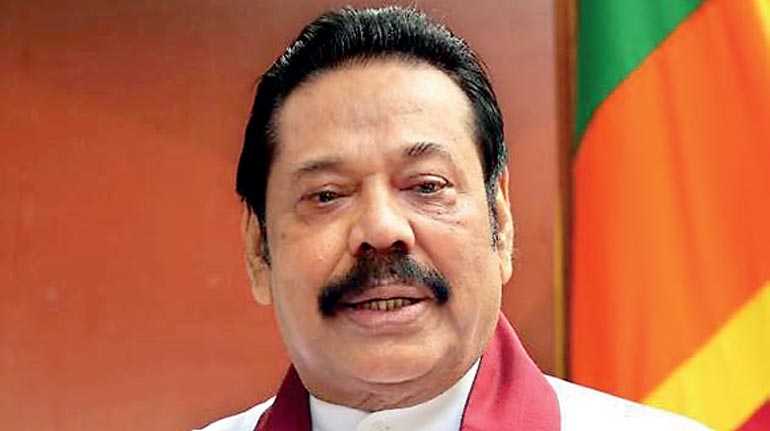Monday Nov 17, 2025
Monday Nov 17, 2025
Tuesday, 3 December 2019 02:35 - - {{hitsCtrl.values.hits}}

Prime Minister Mahinda Rajapaksa
Finance Min. says fiscal deficit could be as high as 7% of GDP
Assures Govt. already focused on strengthening fiscal discipline
Aims to reduce deficit to 4% in medium term
Debt to be rationalised to manageable levels
Stimulus package to be rolled out with policy framework consistent with other reforms
Focus on public expenditure management, SOE improvement and better governance
Engagement with IMF and development partners to continue
Priority to capitalise on Maha season to assist farmers and improve food security
The Finance Ministry yesterday said the fiscal deficit could be as high as 7% of GDP in 2019 due to plummeting revenue caused by slow growth and the Easter Sunday attacks but assured that the Government would “recalibrate” operations to strengthen fiscal discipline and reduce the deficit to 4% in the medium term.
In a statement, the ministry said many measures were in the pipeline to ensure that strong fiscal discipline was maintained within the Government machinery so that public resources were used effectively, ensuring fiscal responsibility.
“The expected fiscal deficit for 2019 will be more than the estimate and could settle around 7% of GDP, due to both a significant dip in revenue than expected mainly due to slow growth and an increase in election-related spending. Thus, the Government will make a concerted effort to recalibrate its operations along a sustainable deficit reduction path towards 4% of GDP in the medium term, together with a rationalisation of the debt stock to manageable levels.”
The statement focused on the stimulus package announced by the Government last week and emphasised that it would be rolled out within a structure to ensure there was no overheating of the economy.
“These policy measures would be implemented within a coherent policy framework, consistent with other key reform priorities with regard to public expenditure management, state enterprise improvements and simplification of administrative systems and procedures to provide quality governance.”
The Finance Ministry, which is held by Prime Minister Mahinda Rajapaksa, also assured such efforts would be complemented by the continuing relationship with international financial institutions and development partners that have committed to Sri Lanka’s progress and prosperity. The Government has already said it will hold talks with the International Monetary Fund (IMF) to take forward the $ 1.5 billion External Fund Facility (EFF), which is due to be completed by mid-2020.
“The Government’s commitment towards a prudent fiscal management regime is reflected at the outset itself in its decision to rationalise the Cabinet of Ministers and its restrictions on non-priority public spending.”
The statement said the Cabinet had already issued instructions to all ministries, departments, state enterprises and other institutions that action must be taken to control their expenditure.
“These include managing the staff, establishment costs, restricting vehicle purchases, building and office spaces and undue year-end purchases, thus adhering to strict budgetary discipline complemented by a strong monitoring framework. The reduction in the indirect taxes will generate substantial savings at the ministries, departments and other institutions as well.”
The statement went on to say that arrangements were also in place to make appointments to key positions at State Owned Enterprises (SOEs) through a selection process, led by a special committee, with the aim of finding qualified and talented personnel to turn around loss-making SOEs to profitable entities.
“The new tax reform initiative is a fulfillment of a pledge given in the election manifesto of President Gotabaya Rajapaksa. The reforms constitute a much-needed transformation in the country’s tax system to address the numerous problems stemming from its extreme complexity with the multiplicity of taxes that has resulted in many distortions, corruption, irregularities and violation of some basic taxation principles, norms and affordability to the tax-paying community,” the statement said.
This reform initiative is undertaken in the backdrop of many economic challenges. The Budget deficit too has exceeded the announced fiscal target. Moreover, the Government has observed that, with the low growth in credit and monetary aggregates along with the underperforming economy, there is leeway to provide a substantial fiscal and credit stimulus to increase aggregate demand in the economy. Hence this is timely as it stimulates economic activities and eases the tax burden on the general public. This will also create a conducive environment for the private sector for its business planning and investment decisions, thereby more economic activities will be generated in the short to medium term, boosting economic growth. The removal of Nation Building Tax (NBT) and the reduction of Value Added Tax (VAT) to 8% will reduce prices of most goods and services which will also result in a moderation in inflation, the statement noted.
The Government’s immediate priority is to capitalise on the opportunity created for the 2019/2020 Maha season through favourable weather to lift the agriculture sector to full capacity to improve the livelihood of the farming community and ensure food security.
Incentives provided for tourism, Information Technology and enabling services, the construction and property market, exports and rural agriculture and overseas employment earning for professionals are expected to drive the economy with price stability.
